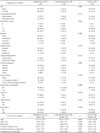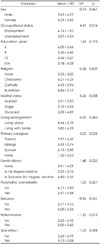Abstract
Objectives
This study aimed to investigate the medication adherence rate and related factors in chronic schizophrenia.
Methods
A total of 65 (34 male and 31 female) outpatients with schizophrenia and with less than 5 years schizophrenia treatment were randomly selected to participate in the study survey. Medication adherence rate was evaluated by counting remaining tablets. The Korean version of Drug Attitude Inventory-10 (KDAI-10) was used to determine the subjective adherence rate. Adherence was defined as a patient taking more than 80% of their total prescribed medication. Positive KDAI-10 scores indicate good adherence.
Results
The rate of good adherence was 87.7%. Our analysis showed that an older age (r=0.323, p=0.009), longer duration of illness (r=0.296, p=0.017), employment (F=4.41, p=0.016), remaining married (F=5.26, p=0.008), and being supported by family members, especially spouse or siblings (F=3.02, p=0.025) were significantly associated with good adherence. Presence of symptoms such as delusion (p=0.033) and hallucination (p=0.032) were related to poor adherence.
Conclusion
The results indicate that future study should investigate patient characteristics associated with medication adherence and analyze the clinician/patient alliance and its affect on adherence. The results also show that further studies might be useful in developing and validating measures of adherence, as well as in designing and evaluating interventions to improve adherent behaviors.
Figures and Tables
References
1. Barofsky I. Compliance, adherence and the therapeutic alliance: steps in the development of self-care. Soc Sci Med. 1978; 12:369–376.

2. Boyd JR, Covington TR, Stanaszek WF, Coussons RT. Drug defaulting. I. Determinants of compliance. Am J Hosp Pharm. 1974; 31:362–367.
4. Byerly MJ, Nakonezny PA, Lescouflair E. Antipsychotic medication adherence in schizophrenia. Psychiatr Clin North Am. 2007; 30:437–452.

5. Lacro JP, Dunn LB, Dolder CR, Leckband SG, Jeste DV. Prevalence of and risk factors for medication nonadherence in patients with schizophrenia: a comprehensive review of recent literature. J Clin Psychiatry. 2002; 63:892–909.

6. Kamali M, Kelly BD, Clarke M, Browne S, Gervin M, Kinsella A, et al. A prospective evaluation of adherence to medication in first episode schizophrenia. Eur Psychiatry. 2006; 21:29–33.

7. Novak-Grubic V, Tavcar R. Predictors of noncompliance in males with first-episode schizophrenia, schizophreniform and schizoaffective disorder. Eur Psychiatry. 2002; 17:148–154.

8. Linden M, Godemann F, Gaebel W, Köpke W, Müller P, Müller-Spahn F, et al. A prospective study of factors influencing adherence to a continuous neuroleptic treatment program in schizophrenia patients during 2 years. Schizophr Bull. 2001; 27:585–596.

9. Fenton WS, Blyler CR, Heinssen RK. Determinants of medication compliance in schizophrenia: empirical and clinical findings. Schizophr Bull. 1997; 23:637–651.

10. Robinson DG, Woerner MG, Alvir JM, Geisler S, Koreen A, Sheitman B, et al. Predictors of treatment response from a first episode of schizophrenia or schizoaffective disorder. Am J Psychiatry. 1999; 156:544–549.
13. Park KG, Won SH, Kim SH, Kim HD, Kang BJ. The factors affecting follow-up treatment of schizophrenia after discharge. J Korean Soc Biol Ther Psychiatry. 1998; 4:210–222.
14. Lee YH, Kim E. Factors on treatment compliance=illness behavior of schizophrenics under the long-term treatment. J Korean Neuropsychiatr Assoc. 1989; 28:292–305.
15. Kwon JS, Shin SW, Cheong YM, Park KH. Medication compliance in psychiatric outpatients of a university hospital. J Korean Neuropsychiatr Assoc. 1997; 36:523–529.
16. Perkins DO. Predictors of noncompliance in patients with schizophrenia. J Clin Psychiatry. 2002; 63:1121–1128.

18. Velligan DI, Weiden PJ, Sajatovic M, Scott J, Carpenter D, Ross R, et al. The expert consensus guideline series: adherence problems in patients with serious and persistent mental illness. J Clin Psychiatry. 2009; 70:Suppl 4. 1–46. quiz 47-48.
19. Hogan TP, Awad AG, Eastwood R. A self-report scale predictive of drug compliance in schizophrenics: reliability and discriminative validity. Psychol Med. 1983; 13:177–183.

20. Hogan TP, Awad AG. Subjective response to neuroleptics and outcome in schizophrenia: a re-examination comparing two measures. Psychol Med. 1992; 22:347–352.

21. Yoon BH, Bahk WM, Lee KU, Hong CH, Ahn JK, Kim MK. Psychometric properties of Korean version of drug attitude inventory (KDAI-10). Korean J Psychopharmacol. 2005; 16:480–487.
22. Colis MJ, Steer RA, Beck AT. Cognitive insight in inpatients with psychotic, bipolar, and major depressive disorders. J Psychopathol Behav Assess. 2006; 28:243–250.

23. Kim YL, Youn T, Kim MS. Cognitive insight in schizophrenic patients. Korean J Clin Psychol. 2005; 25:1011–1127.
24. Gilmer TP, Dolder CR, Lacro JP, Folsom DP, Lindamer L, Garcia P, et al. Adherence to treatment with antipsychotic medication and health care costs among medicaid beneficiaries with schizophrenia. Am J Psychiatry. 2004; 161:692–699.

25. Valenstein M, Ganoczy D, McCarthy JF, Kim HM, Lee TA, Blow FC. Antipsychotic adherence over time among patients receiving treatment for schizophrenia: a retrospective review. J Clin Psychiatry. 2006; 67:1542–1550.

26. Nosé M, Barbui C, Tansella M. How often do patients with psychosis fail to adhere to treatment programmes? A systematic review. Psychol Med. 2003; 33:1149–1160.

27. Jónsdóttir H, Opjordsmoen S, Birkenaes AB, Engh JA, Ringen PA, Vaskinn A, et al. Medication adherence in outpatients with severe mental disorders: relation between self-reports and serum level. J Clin Psychopharmacol. 2010; 30:169–175.
28. Dibonaventura M, Gabriel S, Dupclay L, Gupta S, Kim E. A patient perspective of the impact of medication side effects on adherence: results of a cross-sectional nationwide survey of patients with schizophrenia. BMC Psychiatry. 2012; 12:20.

29. Adelufosi AO, Adebowale TO, Abayomi O, Mosanya JT. Medication adherence and quality of life among Nigerian outpatients with schizophrenia. Gen Hosp Psychiatry. 2012; 34:72–79.

30. Dassa D, Boyer L, Benoit M, Bourcet S, Raymondet P, Bottai T. Factors associated with medication non-adherence in patients suffering from schizophrenia: a cross-sectional study in a universal coverage health-care system. Aust N Z J Psychiatry. 2010; 44:921–928.

31. Waterreus A, Morgan VA, Castle D, Galletly C, Jablensky A, Di Prinzio P, et al. Medication for psychosis--consumption and consequences: the second Australian national survey of psychosis. Aust N Z J Psychiatry. 2012; 46:762–773.

32. Acosta FJ, Hernández JL, Pereira J, Herrera J, Rodríguez CJ. Medication adherence in schizophrenia. World J Psychiatry. 2012; 2:74–82.

33. Hui CL, Chen EY, Kan C, Yip K, Law C, Chiu CP. Anti-psychotics adherence among out-patients with schizophrenia in Hong Kong. Keio J Med. 2006; 55:9–14.

34. Diaz E, Woods SW, Rosenheck RA. Effects of ethnicity on psychotropic medications adherence. Community Ment Health J. 2005; 41:521–537.

35. Remington G, Kwon J, Collins A, Laporte D, Mann S, Christensen B. The use of electronic monitoring (MEMS) to evaluate antipsychotic compliance in outpatients with schizophrenia. Schizophr Res. 2007; 90:229–237.

36. Nakonezny PA, Byerly MJ. Electronically monitored adherence in outpatients with schizophrenia or schizoaffective disorder: a comparison of first- vs. second-generation antipsychotics. Schizophr Res. 2006; 82:107–114.

37. Ibrahim AW, Yahya S, Pindar SK, Wakil MA, Garkuwa A, Sale S. Prevalence and predictors of sub-optimal medication adherence among patients with severe mental illnesses in a tertiary psychiatric facility in Maiduguri, North-eastern Nigeria. Pan Afr Med J. 2015; 21:39.

38. Draine J, Solomon P. Explaining attitudes toward medication compliance among a seriously mentally ill population. J Nerv Ment Dis. 1994; 182:50–54.

39. Tehrani E, Krussel J, Borg L, Munk-Jørgensen P. Dropping out of psychiatric treatment: a prospective study of a first-admission cohort. Acta Psychiatr Scand. 1996; 94:266–271.

40. Krueger KP, Felkey BG, Berger BA. Improving adherence and persistence: a review and assessment of interventions and description of steps toward a national adherence initiative. J Am Pharm Assoc (2003). 2003; 43:668–678. quiz 678-679.
41. Fleischhacker WW, Oehl MA, Hummer M. Factors influencing compliance in schizophrenia patients. J Clin Psychiatry. 2003; 64:Suppl 16. 10–13.
42. Burton SC. Strategies for improving adherence to second-generation antipsychotics in patients with schizophrenia by increasing ease of use. J Psychiatr Pract. 2005; 11:369–378.

43. Valenstein M, Blow FC, Copeland LA, McCarthy JF, Zeber JE, Gillon L, et al. Poor antipsychotic adherence among patients with schizophrenia: medication and patient factors. Schizophr Bull. 2004; 30:255–264.

44. Peuskens J, Olivares JM, Pecenak J, Tuma I, Bij de Weg H, Eriksson L. Treatment retention with risperidone long-acting injection: 24-month results from the Electronic Schizophrenia Treatment Adherence Registry (e-STAR) in six countries. Curr Med Res Opin. 2010; 26:501–509.

45. Acosta FJ, Bosch E, Sarmiento G, Juanes N, Caballero-Hidalgo A, Mayans T. Evaluation of noncompliance in schizophrenia patients using electronic monitoring (MEMS) and its relationship to sociodemographic, clinical and psychopathological variables. Schizophr Res. 2009; 107:213–217.

46. Kane JM. Review of treatments that can ameliorate nonadherence in patients with schizophrenia. J Clin Psychiatry. 2006; 67:Suppl 5. 9–14.




 PDF
PDF ePub
ePub Citation
Citation Print
Print






 XML Download
XML Download